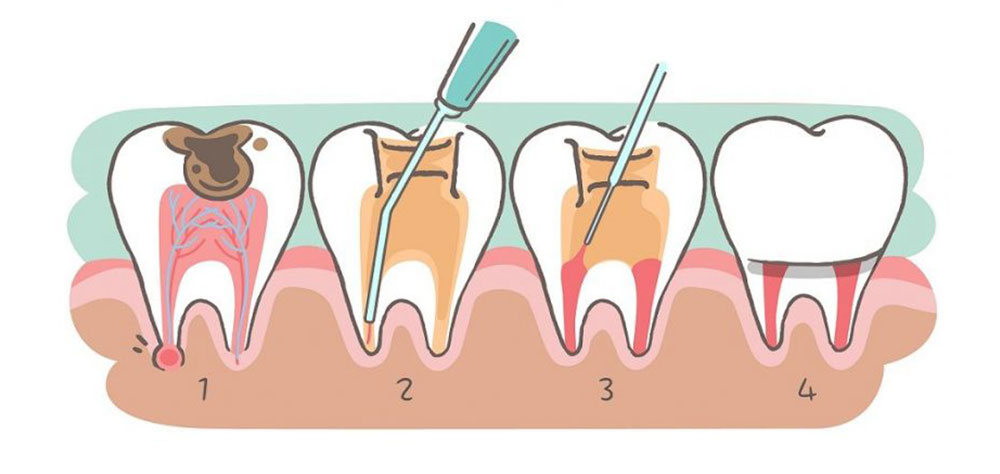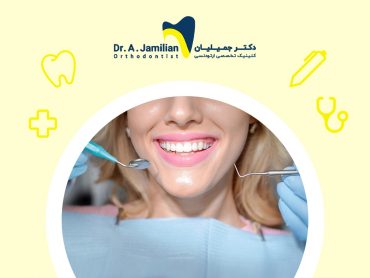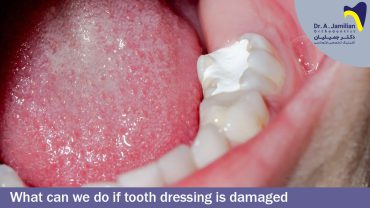Toothache is amongst the pains that most people commonly experience for everyone, even for once. Toothaches are known to have many different types/variety of causes. The most common cause of a toothache is Tooth Decay, specifically when it spreads to the roots. A root canal should be done and monitored by an endodonist. In the following parts, we intend to introduce you to the root canal treatment
Steps Of A Root Canal Treatment
In order to do a root canal treatment, the dentist first uses anesthetic to numb the gum tissue around the tooth. Then the dentist will begin to completely remove the decays from the tooth, and drain the infection of the pulp. After the infection of the damaged tooth is completely emptied, the germs in the dental canals are removed by the dentist. Then the root of the tooth will be finally emptied.

In order to make sure that the damaged root is completely drained, the dentist takes a x-ray (x-ray) from the tooth. When the drainage is ensured, he fills the nerve canals with special materials which are compatible with dental tissues. Finally, he also fills the teeth with composite or amalgam.
Tip: the teeth that have been timely treated by a root canal can last for many years. This issue depends on how you observe your dental and oral health. Also, do not chew food during a root canal treatment while your tooth has got a dressing. This may cause the tooth wall to break or the tooth to become infected.
When Should We Get Root Canal Treatment And Endodontics?
Tooth decays may be of different degrees. If decay spots are seen on the enamel and dentin, they will not cause any pain. In this case our teeth need some slight treatment (composite filling), but if the treatment is not done, the decay spreads and the infection enters the tooth pulp (the soft tissue in the center of the tooth) and reaches the tooth nerves by pressing on the tooth roots. At this time, in addition to filling and repairing the tooth, you also need a root canal and endodontics. This is due to the pressure on the pulp chamber being much greater at night rather than the day. Thus, the pain developed by reaching this stage of tooth decay is felt more often during night. The symptoms that show the tooth decay has reached the nerve, and as a result the tooth needs a root canal treatment and endodontics include:
- Severe toothaches after eating hard foods
- A sudden and sharp pain in teeth when having food, water or drinks which are either too cold or too hot
- Feeling a sharp pain in the tooth without any causes or a prolonged toothache with such unbearable pain
- Black teeth along with deep holes on the damaged tooth or the tooth walls’ getting decayed
- The patient’s toothache in case of contact with or blow to the tooth
- The possibility that the tooth will loosen with the decay reaching the root of the tooth
- Possibility of a swollen face or inflated gums with the increase of the infection in a decayed tooth
- During the first few days after the root canal and endodontics treatment, due to tooth sensitivity there may be some pain in the filled tooth which is completely normal. A toothache will disappear in a few days.
What Will Happen If The Root Canal And Endodontics Are Not Carried Out On Time?
In multiple cases, the toothache may disappear and this may cause people to delay their root canal treatment and endodontics. However, this relief is completely temporary and the cause is the excessive infection of the damaged tooth. When a root canal treatment is not done early after the decay of the nerves, the infection will affect all the nerve canals in the injured tooth.
The infection extends to the ending of the nerves and the root of the tooth and in most cases it will cause an abscess at the end of the root. When an abscess is noticed, the toothache will be much more unbearable. In addition to that, in order to treat a toothache, dental abscesses need to be removed. If they are impossible to empty, then the dentist has to extract the damaged tooth.
In some cases, the tooth gets totally infected. Also, the root of the tooth is completely decayed and as a result it is impossible to maintain and treat this tooth. Therefore, the dentist recommends the patient to extract the decayed tooth before it can lead to a cyst and an abscess.
Frequently Asked Questions About The Root Canal Treatment And Endodontics
1-Are the root canal treatment and endodontics painful?
The majority of patients that require root canal treatment are afraid of it. This reason varies throughout patients, however, they shouldn’t be scared. As treatment and endodontics are done under complete anesthesia. On top of this, the patient does not feel any pain during this stage, and afterpain can be relieved by taking a painkiller.
2-Why are the root canal treatment and endodontics done in two steps?
In the first stage of a root canal treatment, the infection of the tooth is drained and emptied. Dental infection is usually so severe that it takes several days to be cleaned and cured. Thus, dental restorations can be put properly on the tooth without getting infected again. During this time, a temporary dressing is placed on the tooth to avoid infection.
3-Is it better to extract the tooth or treat it by having a root canal and endodontics?
The patient had better repair and treat his natural teeth. In case the decay is so huge that it is impossible to keep the tooth, the tooth is without doubt extracted.
4-How helpful is an X-ray in distinguishing the necessity of a root canal treatment?
In some cases, a toothache is not so severe that the patient can feel the necessity for a root canal treatment. However, a professional dentist may suspect the need for this treatment after perceiving the relevant symptoms and signs. In these cases, taking a radiograph of the tooth will make it possible to detect the necessity for an endodontic treatment.



